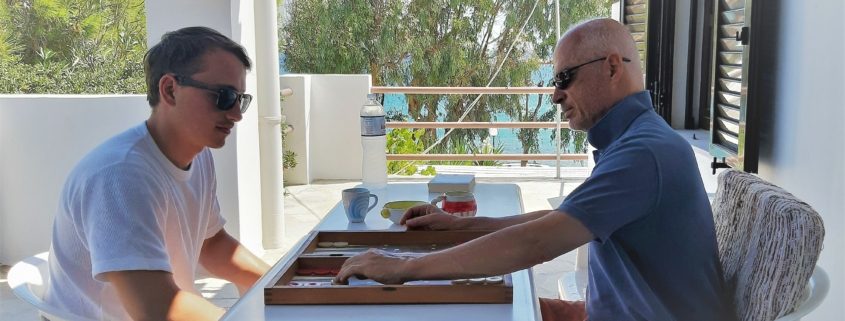Playing Tavli or Backgammon is a very popular Greek habit. Almost every Greek has enjoyed a sunny morning with cold coffee (preferably a frappe) and a round of “Portes” or a summer afternoon with a glass of ouzo accompanied by a “meze” and a round of “Plakoto”.
Το τάβλι είναι μία ιδιαίτερα δημοφιλής συνήθεια των Ελλήνων. Σχεδόν όλοι έχουν απολαύσει ένα ηλιόλουστο πρωινό με έναν κρύο καφέ (κατά προτίμηση φραπέ) και μία παρτίδα «πόρτες» ή ένα καλοκαιρινό απόγευμα με ουζάκι συνοδευόμενο με μεζέ και ένα γύρο «πλακωτό».
What is Backgammon?
Backgammon is a board game for 2 players. It consists of one board, twelve checkers for each player, and two dice. Tavli or backgammon has different ways of playing. The main games are: “Portes” (doors), Plakoto (crash down) and “Fevga” (leaves). All games combine luck with strategy. The result depends on the dice and the player’s ability to move the checkers. The duration of each game is not very long, so the suspense and interest are always very high.
Το τάβλι είναι ένα επιτραπέζιο παιχνίδι για δύο παίκτες. Αποτελείται από ένα ταμπλό, δώδεκα πούλια για κάθε παίκτη και δύο ζάρια. Το τάβλι έχει διάφορους τρόπους παιξίματος. Τα βασικά παιχνίδια είναι: οι «πόρτες», το «πλακωτό» και το «φεύγα». Όλα τα παιχνίδια συνδυάζουν την τύχη με την στρατηγική. Το αποτέλεσμα εξαρτάται από τα ζάρια αλλά και από την ικανότητα του παίκτη να μετακινεί τα πούλια έξυπνα. Η διάρκειά κάθε παρτίδας δεν είναι πολύ μεγάλη και έτσι η αγωνία και το ενδιαφέρον είναι πάντα πολύ υψηλά. Το αποτέλεσμα ανατρέπεται εύκολα.
Some history
Backgammon is known since Antiquity and has several varieties. In Mesopotamia and in Egypt, a game similar to modern backgammon already existed. Later, we find it in Greece with the name “Pessoi” and in the Roman Empire with the name Ludus Duodecim Scriptorum (game of 12 letters). Also in the Middle Ages, it was popular, although the church prohibited playing backgammon. When it was banned in England, the English players made a board that looked like a book so they were able to carry it without fear. Backgammon owes its current appearance to this “construction”.
Το τάβλι, σε διάφορες παραλλαγές, είναι γνωστό από την Αρχαιότητα. Στην Μεσοποταμία και στην Αίγυπτο υπήρχε ένα παιχνίδι παρόμοιο με το σημερινό τάβλι. Αργότερα, συναντάται στην Ελλάδα με το όνομα «Πεσσοί» και στην Ρωμαϊκή Αυτοκρατορία με το όνομα Ludus Duodecim Scriptorum (παιχνίδι των δώδεκα γραμμάτων). Στον Μεσαίωνα, επίσης ήταν πολύ δημοφιλές, αν και η εκκλησία το απαγόρευσε ή το κατέκρινε ως τυχερό παιχνίδι. Όταν απαγορεύτηκε στην Αγγλία, οι Άγγλοι παίκτες έφτιαξαν το ταμπλό έτσι ώστε να φαίνεται σαν βιβλίο και έτσι να το μεταφέρουν χωρίς φόβο. Σε αυτήν την κατασκευή οφείλει το τάβλι την σημερινή εμφάνισή του.
In modern Greece, backgammon is popular within every age. In the beginning, you could find it in men’s cafes (kafeneia). Men who used to frequent the cafes were playing cards and backgammon. Gradually everyone loved it and “tavli” even ended up being a student habit. Today, you can see people playing backgammon everywhere: on the beach, on the boat, in the café, in the park, … (sometimes it is not allowed in enclosed areas because it is a bit noisy…)
Στην σύγχρονη Ελλάδα το τάβλι είναι δημοφιλές σε όλες τις ηλικίες. Αρχικά το συναντούσες σε καφενεία. Οι άνδρες που συχνάζουν στα καφενεία, εκτός από χαρτιά, παίζουν και τάβλι. Σιγά -σιγά αγαπήθηκε από όλους και κατέληξε να γίνει μια φοιτητική συνήθεια. Σήμερα, μπορείς να δεις παντού να παίζουν τάβλι: σε παραλίες, σε καφενεία, σε καφετέριες (καμιά φορά σε κλειστούς χώρους ίσως να μην επιτρέπεται διότι είναι λίγο θορυβώδες…).
And at Omilo!
During one of our Greek courses on the island of Syros, the Omilo teachers were teaching the Omilo students how to play “portes” (“doors”) or how to improve their scores. It seemed to be popular since many bought backgammon before returning home! So what do you think? Maybe a good idea to ask or buy as a Birthday Present?
Αρκετοί μαθητές μας έμαθαν να παίζουν πόρτες ή βελτίωσαν τις επιδόσεις τους και πριν γυρίσουν στην πατρίδα τους αγόρασαν ένα τάβλι! Εσείς μάθατε τάβλι;









